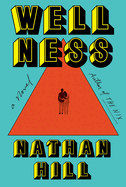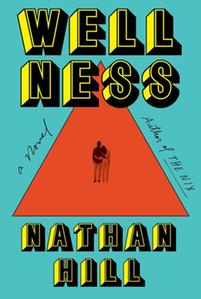
 It's been seven years since the publication of Nathan Hill's first novel, The Nix, but anyone who loved that book will be delighted he's returned with equally expansive, audacious, and bighearted style in Wellness. In a novel that's both emotionally astute and deeply attuned to the 21st-century American zeitgeist, Hill also remains true to the imperative to tell a good story.
It's been seven years since the publication of Nathan Hill's first novel, The Nix, but anyone who loved that book will be delighted he's returned with equally expansive, audacious, and bighearted style in Wellness. In a novel that's both emotionally astute and deeply attuned to the 21st-century American zeitgeist, Hill also remains true to the imperative to tell a good story.
When photographer and artist Jack Baker and Elizabeth Augustine, who's committed to "studying the whole human condition," meet as first-year college students in Chicago in 1993, their improbably romantic origin story seems to set them on course for a life of relationship bliss. But by the time they've reached the 20th anniversary of their first encounter, they've hit the bottom of the U-shaped happiness curve identified by some economists and behavioral psychologists, and the sweetness of their young love has curdled into nagging dissatisfaction. They're married, with a behaviorally challenged eight-year-old son, sparring over the details of their "forever home"--a stylish condo in a "liberal, leafy, and loaded" suburb of Chicago--and mired in a sex life so unfulfilling that they're lured into investigating polyamory.
In excavating the roots of Jack's and Elizabeth's angst, Hill displays impressive virtuosity. The novel takes its title from the euphemistically named institute where Elizabeth, a psychologist, studies the power of placebos. That's only one of the provocative subjects--among them the obsession with self-improvement, the seductive power of social media, and, above all, the unrelenting pressure of life in a world in which "[o]ur lives have never before been so free of immediate physical threats, and yet we've never felt so threatened"--that Hill explores with the benefit of extensive, and cleverly deployed, research. Navigating the pressures of careers and parenting in this highly charged environment, Jack and Elizabeth gradually lose their focus on the roots of their attraction.
Yet it soon becomes clear that Hill isn't only interested in a story that resonates with an assortment of trendy topics, but that, in the process, risks being as disposable as yesterday's headlines. He follows Jack back to a difficult upbringing as the sickly child of emotionally distant parents on a small ranch on the Kansas prairie, and a tragedy there that has haunted him for some 30 years. Elizabeth was born to a family that revels in its multigenerational wealth, but whose outsized expectations have inflicted their own form of lingering damage on her. Until both reckon with these wounds, there's no possibility their relationship can heal.
With an ample supply of dramatic plot twists and a pair of protagonists who remain, even in their worst moments, deeply sympathetic, Wellness gives the lie to its character who says, "traditional storytelling is dying." In the hands of a writer as extravagantly gifted as Nathan Hill, it's very much alive. --Harvey Freedenberg, freelance reviewer
Shelf Talker: Blending a contemporary sensibility with traditional style, the extravagantly gifted Nathan Hill's second novel dissects the tensions of romantic relationships in midlife.

